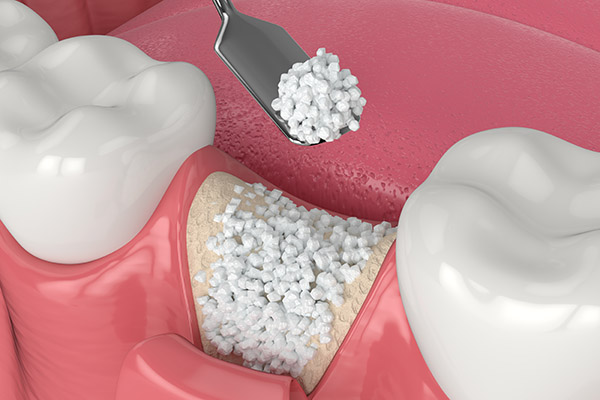 Implant dentistry involves the replacement of natural teeth after tooth loss occurs using titanium posts (known as dental implants) and the attachment of a restoration, such as a dental crown, dental bridge, or denture. A bone graft is often necessary before an implant dentistry procedure, particularly when there is not enough healthy bone inside the jaw to support the implants.
Implant dentistry involves the replacement of natural teeth after tooth loss occurs using titanium posts (known as dental implants) and the attachment of a restoration, such as a dental crown, dental bridge, or denture. A bone graft is often necessary before an implant dentistry procedure, particularly when there is not enough healthy bone inside the jaw to support the implants.
A bone graft before implant dentistry procedure explained
A bone graft involves grafting bone material inside of the jaw after bone loss occurs to ensure dental implants are adequately supported. This review discusses when a bone graft may be needed before an implant dentistry procedure, the benefits of a bone graft procedure, and more.
What is the purpose of a bone graft before an implant dentistry procedure?
The purpose of a bone graft before an implant dentistry procedure is to increase the amount of bone inside of the jaw. Otherwise, the dental implants may not have enough support and can increase the risk of dental implant failure, which complicates the teeth replacement process. Only patients who have experienced bone loss in the jaw require a bone graft procedure for implant dentistry.
How safe is a bone graft procedure?
A bone graft consists of taking bone from another part of the body (autograft) and grafting it inside of the jaw above or below where the implants will be placed. This is considered oral surgery, so sedation is required. There may also be a recovery period of time, although the risks are minimal and severe side effects are rare.
What are the benefits of a bone graft before implant dentistry?
As mentioned, the purpose of a bone graft is to replenish bone loss in the jaw, which may be necessary due to bone atrophy after the loss of one or more teeth or bone loss caused by periodontal disease. This also helps ensure the dental implants and restoration last for a long time without needing repair or replacement.
When is a bone graft procedure required?
A bone graft procedure is required if there is not enough bone inside of the jaw to adequately support full-sized dental implants long-term. As mentioned, this may be necessary due to atrophy or bone loss caused by periodontitis. A dentist can determine whether or not a bone graft procedure is necessary before implant dentistry during the first visit.
What happens after a bone graft procedure?
The placement of dental implants can be scheduled after a bone graft procedure. The mouth will need to heal after the bone graft, however, so the dentist may wait until the bone graft has been successful to schedule the placement of the dental implants.
Talk to our implant dentistry team about treatment
If you have one or more missing teeth and want to learn more about teeth replacement with implant dentistry, then contact us by phone or message today. During your first visit, we can discuss your treatment goals and put together a treatment plan that helps you achieve the smile of your dreams with implant dentistry.
Request an appointment or call Gledhill Dental at 509-800-8410 for an appointment in our Kennewick office.
Related Posts
Implant supported dentures combine traditional dentures with permanent dental implants to provide a stable and secure tooth restoration option. Unlike traditional removable dentures, this option is supported by two or more dental implants rather than your gum tissues. The additional stability of dental implants may make it simpler to bite and chew meals, particularly with…
Having a solid handle on good oral hygiene basics will help preserve the integrity of your teeth and mouth health for a long time to come. Steering clear of cavities, receding gums, or decay ensures that your smile is bright and beautiful for as long as possible. If you think you already have an excellent…
Having a firm understanding of oral hygiene basics can prevent tooth decay, gum disease, and general oral discomfort. Human beings go through life developing a range of habits that impact oral health, some of which are good and some of which are bad. Avoiding these damaging behaviors promotes strong teeth and gums that can last…


